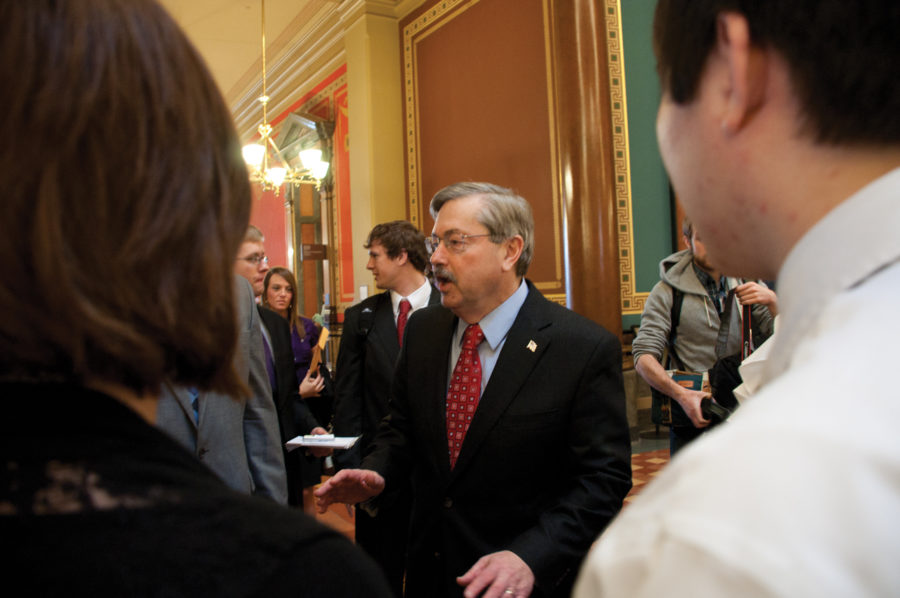Iowa legislature to decide on tuition freeze and other issues
Photo: Karuna Ang/Iowa State Daily
Gov. Terry Branstad talks to the Iowa State College Republicans on Monday at the Iowa State Capitol.
January 13, 2014
The 85th Iowa General Assembly session that started today will decide on the tuition-freeze for in-state students and other issues impacting students.
Gov. Terry Branstad laid out his agenda for the legislative session at a press conference last week. Some items on his list included opposing the new renewable fuel standard, advocating for anti-bullying legislation, supporting Iowa Base House to recruit veterans into the workforce and pension reform, among others. Branstad said that he would focus on these bipartisan issues in an election year.
”One of the priorities at the top of my list is to work on the tuition freeze,” said Sen. Herman Quirmbach, D-Ames. “[The governor] has been saying positive things about that proposal in recent weeks and I am very pleased about that. But, he hasn’t made a full commitment yet. We haven’t heard a whole lot from the House Republicans.”
The Board of Regents approved the tuition freeze proposal last December for the second year in a row. The plan includes a freeze in tuition fees for in-state undergraduate students. The freeze is dependent on a four percent increase in general university funding. Branstad has stated his support for the freeze, though some Republicans did not fully support the additional funding.
”I can’t guarantee the request of the Regents regarding the tuition freeze for a second year. Philosophically, not increasing tuition is absolutely something I support. But, it’s got to be financially feasible as well,” said Sen. Amy Sinclair, R-Allerton. She stressed having a stable budget in place for the state in light of the declined revenues in December.
Quirmbach said he is still optimistic about getting through the tuition freeze proposal. He stated his support for the freeze because of the increasing cost of tuition and the resulting student debt. He is in touch with members of the Government of the Student Body members to know about student demands and has received positive feedback on the tuition freeze issue.
One contentious issue in this session includes raising the minimum wage. Democrats have supported raising the minimum wage while Republicans, including the governor, are not on board with the idea.
“I don’t necessarily support changing the minimum wage,” Sinclair said. “Not because good employees don’t deserve good pay, but I don’t think it is the state’s job.”
Quirmbach explained that a rise in the minimum wage means a lot to college students.
“There are a lot of students who work summer jobs or part-time during school, who are at or near the minimum wage,” he said. “Raising the minimum wage is going to make it easier to come to school without doing so much borrowing.
“With the general public, this is an overall winner. The question is whether legislators in the other body are going to be listening to their constituents. If they are, I think we can get this done,” Quirmbach said.”
Quirmbach said he supports a higher price on gas to better serve transportation needs of the state.
Sinclair did not approve of any proposal to increase fuel tax. She added that transportation needs can be fulfilled outside the fuel tax with measures like targeted road repairs.
“I think one of the things we have been heavily investing in the state is new prisons and I see that coming to an end. I see more dollars being freed up for education and state owned buildings,” said Sen. Matt McCoy, D-Des Moines and co-chairman of the Transportation, Infrastructure and Capital Budget subcommittee. He said he has been following up on projects in the works, especially those at the regent universities.
McCoy said he expects specific recommendations for infrastructure from the governor’s five-year plan. The existing public-private funding model for infrastructure projects is likely to continue as the infrastructure committee has more demands than its allotted budget.
The legislature will be in session through April 22.







